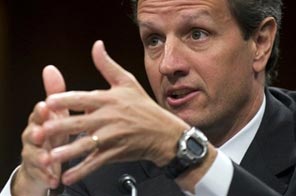Strong dollar 'very important' for US: Geithner
TOKYO: US Treasury Secretary Timothy Geithner said here Wednesday that a strong dollar was "very important" to the United States, seeking to reassure Asian nations concerned about the greenback's recent slump.
"I believe deeply that it's very important for the US and the economic health of the US that we maintain a strong dollar," Geithner told reporters.
US officials regularly express their backing for a "strong dollar" but have done nothing to arrest its slide, which many see as necessary to reduce the big US trade deficit.
The dollar has plunged about 15 percent against a basket of six other major currencies from a peak earlier this year, sparking concern among Asian countries who have big holdings of dollars in their foreign exchange reserves.
The dollar's weakness is also bad news for many Asian exporters, which are struggling to maintain their competitiveness, particularly against Chinese rivals benefiting from the relative stability of the yuan.
Geithner also said he believed China recognised it would be beneficial for its economy to allow greater flexibility in the yuan exchange rate.
He said China was playing a key role in driving the global economy and economic reforms in Asia's second largest economy would take some time.
For years, the United States has urged Beijing to deepen the reform of its exchange rate regime, hinting that China kept the value of the yuan, or renminbi, artificially low to boost exports.
Beijing re-pegged the yuan to the US dollar in July 2008 as the global financial crisis hit its exports.
Geithner stopped off in Japan on his way to a meeting of finance chiefs from member nations of the Asia-Pacific Economic Cooperation (APEC) forum on Thursday in Singapore.
Japanese Finance Minister Hirohisa Fujii told Geithner in a meeting late Tuesday that Tokyo believes Washington's strong dollar policy is "correct".
The US Treasury chief also met Japanese Prime Minister Yukio Hatoyama on Wednesday and was due to have a working lunch with Bank of Japan governor Masaaki Shirakawa, before heading to Singapore in the evening.
The APEC finance chiefs are expected to pledge to maintain stimulus spending efforts for now, according to a draft communique obtained by AFP Tuesday.
"We agree that the solution is not to rush to fiscal tightening, especially while credit markets are still recovering," the draft text said.






